
40 minute read
album reviews
deep within the fjords, Wild North West is Vreid’s love letter to the place they call home, and their finest hour at that. Though Vreid’s music doesn’t come off as romantic in the slightest, it is the passion fueling their music that really drives the love for their origins home. Be it the stomping, now-signature rock riffs that defined predecessors like Pitch Black Brigade and, more recently, Lifehunger, the melodic, folky black metal that inspired the band’s impetus, or even new-ground ballad “Dazed and Reduced,” Vreid’s multifaceted take on Wild North West demonstrates them to be more than “just a black metal band.”
Accompanying the LP is a full-album video that tells a story of a young person’s experience in the “wild north west” of Sogndal’s past; interwoven, of course, with footage of Vreid tearing it up (in traditional folk garb, no less—sweater game strong, Vreid). The idea of an album-length video isn’t a new one, and yet Vreid’s more conceptual approach makes the visuals inseparable from the musical content within. Even listening to the album on its own, I am reminded of the visuals presented in the video with each new song’s introduction (especially the children’s voices that herald “Into the Mountains,” my personal favorite). Visions of mountains, snow and log cabins abound within Vreid’s most ambitious video work to date, and this video’s near-cozy nature (men in sweaters playing ferocious black metal is kind of adorable) makes a perfect foil for the music.
What is most peculiar about Wild North West is, even though it’s a love letter to Sogndal’s rugged past, the album itself is in English. Though Vreid have made entire albums in English before, one would think the personification of their hometown would be presented in sognamål. This isn’t a complaint, though—rather a surprised comment. Wild North West’s pride is still just as palpable, even though I personally think delivering the album in their home dialect would have made it that much more special. Either way, what Vreid have presented on this latest album is easily their most potent and varied musical outing to date. —JON ROSENTHAL
AGENT STEEL 7
No Other Godz Before Me
CHERRY RED
Eeeeeeeeeeeeeeeeeeee…
A decade ago, yours truly was on a ship in the Caribbean early in the day to see speed metal veterans Agent Steel, the dudes who released the classic Unstoppable Force a lifetime or two ago. The trouble was that singer/mastermind John Cyriis didn’t make the trip, and folks were stuck with seeing last-minute substitute Rick Mythiasin reading from a handful of lyrics scribbled on looseleaf paper. It was friggin’ depressing, and that’s the last thing you want to feel when soaking up the blazing sun on a ship in January. Not long after that sorry display, the band went on indefinite hiatus.
There’s good news, though, as Cyriis took it upon himself to completely revamp Agent Steel, taking on four new band members, and the crew has releasedt No Other Godz Before Me, the band’s first new album in 14 long years. Bolstered by two ace guitarists—Vinicius Carvalho and 20-year-old phenom Nikolay Atanasov—Agent Steel sound reborn, pulling off rampaging arrangements that rival the band’s best work 35 years ago. Better yet, Cyriis is in fine form, his maniacal screams accentuating the instrumentation like a crazed, speed metal King Diamond.
Sure, at times his histrionics can flirt with silliness (the way he enters “Trespassers” bears an uncanny resemblance to the time Apu imitated a hummingbird on The Simpsons) but hell, speed metal has always been a little silly, and the way Cyriis and Agent Steel go all-in with a wonderfully over-the-top performance is huge fun, not to mention endearing as hell. —ADRIEN BEGRAND
BODY VOID 7
Bury Me Beneath This Rotting Earth
PROSTHETIC
Tortured hole
It can be both a blessing and a curse when an album’s opening song works as a perfect summation of a band’s style, sound and strengths. Excitement and compulsion are instant, but the second half of the LP can end up feeling like more of the same, to lesser effect.
Body Void have developed a good feeling for pace after two self-released albums, an EP and a split (not to mention a wealth of demo material under the name Devoid, circa 2014-2016), but the opening song on this four-track, 52-minute Prosthetic debut remains the high point—of both the album and feasibly their career to date. The sluggish sucker-punch riff compels instant sky-punching on the cymbal crashes, and at just the right moment we’re deviated into a frenzied burst of speed, collapsing into gristly drone-doom piled with layers of troubling noise before stomping to a climax with a riff that sounds like the iron man from “Iron Man” wreaking his vengeance to the tune of “Three Blind Mice.”
All four songs run around 13 minutes, each underpinned with an iron spine of a sludge riff, a wandering structure and unfolding drama, stretching and shifting and mostly staying interesting (especially “Forest Fire,” bubbling with atmospheric melodic nuances, subtle segues hung between primevally basic caveman chords). Side two is, largely, more of the same, but to lesser effect—the noiselayering seems less assured and satisfying, and there are few surprises left. However, it is all deployed with tangible passion and bristling conviction, singer/guitarist Will Ryan popping a temple vein over hot-button progressive issues like climate change and trans rights, all the while sounding like a furious witch shrieking hideous incantations in a thunderstorm.
—CHRIS CHANTLER
COFFIN MULCH 7
Septic Funeral
REDEFINING DARKNESS
Bowel burial
A funeral bell. A creak of night-stalking bass. That’s all between you and the coming deluge of feculent filth oozing from Coffin Mulch’s mini-LP, Septic Funeral. After releasing a three-song demo in 2019, these Scottish slime-mongers were scooped up by death metal benefactors Redefining Darkness. The result is a record that splashes in the old-school cesspool like the band’s genre forefathers in Autopsy and Carnage.
While the album’s self-titled opening track is a lumbering introduction, “Black Liquefaction” hammers into your consciousness with swampy grooves and a slashing solo. The Swedeath speed-blasting of “Live Again” reveals tireless percussion, which otherwise settles into a slow to mid-paced stomp. After barking the song’s titular command to the troops, the militant march of “Onward to Death” concludes with the crunch of boots in lockstep.
At just 47 seconds, “Carnivorous Subjugation” is a literal one-trick war horse riding one riff into the grave. Septic Funeral concludes with a re-recording of their eponymous anthem, “Coffin Mulch.” The song’s creeping rot feels like a redundant bookend that in many ways echoes the funereal tempo of the opening track. While the album’s mix (by Tommy Duffin) and mastering (by Andy Lippoldt) captures the grime promised by Adam Burke’s grotesque cover painting, the songwriting relies on horrors already wellestablished by death metal’s golden age. But Coffin Mulch proudly embody that pustulant charm while unapologetically soaking Septic Funeral’s 20-minute runtime in raw sewage. As Skinless once growled in gross-out anthem “Pool of Stool,” “Here I sit in the shit, here I be in the pee.” —SEAN FRASIER


DEMISER 7
Through the Gate Eternal
BORIS
Thrashing was never my business, but this is good
My metal indoctrination was a little different from the traditional Hesher’s Autobiography in that I completely skipped over thrash. It wasn’t that I didn’t like it—I just kind of dove directly into black and death metal very soon into my “I can finally make my own music taste” phase. This may seem like a bit too much information, but hear me out: I don’t have the same sort of nostalgic, heartfelt connection to most thrash that the majority of metal fans have, so when I view an album like Demiser’s Through the Gate Eternal, it’s a little confusing to fully grasp, simply because I don’t have that context of style. The reality is, I can only view this for what it is: a metal album. And it’s a pretty decent one at that.
Demiser play a ripping, fast take on black/ thrash metal, not so much in the “first wave” sense like Venom, but rather something with a more distinct connection to current-day black metal’s definition(s). There is a heavy emphasis on the word “modern” here, as you’ll be in for some of the big-budget “arena black metal” stylizings, which really put them at home alongside Boris Records alumni Cloak. This is made manifest in big, chugging riffs and catchier rhythms which are generally atypical to black/thrash metal.
The big thing about Demiser’s approach is, I feel pretty at home with it—a non-thrasher’s delight, I guess—and the more time I spend with it, the more I think I can dive into thrash and get into something new, even if I’m in my 30s. —JON ROSENTHAL
DVNE
Etemen Ænka
METAL BLADE
7
Mostly great Scots
From the Ocean Collective to Mastodon by way of Isis and Opeth, finding antecedents and points of comparison for Dvne would be all too easy—if, in fact, Etemen Ænka sounded like any of the above, which it doesn’t. What mostly sets the Edinburgh-based progressive sludge quintet’s second full-length apart from any of the above (even in their most maximalist moments) are the album’s density and the ways the band injects new strains of spaciousness into and around that density.
Dvne flex an exceptional command of extreme dynamics from the beginning. Opener “Enûma Eliš” commences under the threshold of audibility, lingering long enough to make at least a few people think some crucial part of their listening experience has gone haywire. Follow-up “Towers” ends on a balancing note, replacing silence with an extended, delicately melodic fade that positions listeners impeccably for “Court of the Matriarch.”
As satisfying as Dvne’s excursions into restraint are, for most of us, they’re still just set-ups for the glorious excesses that characterize both band and album, as well as making
THE CROWN, Royal Destroyer 9
The devil ain’t just in the details! | METAL BLADE The consideration of compositional balance reel wholesale upheaval around a core of might seem like academic horseshit to the unfuckwithable grace. extreme metal layman, especially when—at Hearing that raw bedlam held just at bay a glance—the genre appears to be prefabbed by meticulous compositional structure is one from coat upon coat of sheer excess (whether of death metal’s more peculiar and appealing an excess of velocity or heresy or discord). potentialities, and there’s no better paragon of And hell, isn’t that sort of the point? Don’t that razor’s edge than Royal Destroyer. The fact we want at least some small corner of our that the Crown’s new record manages to outdo lives to be untethered from this type of 2018’s Cobra Speed Venom in every way should fussy analysis? Sometimes, sure. Yet, one immediately flavor-blast your undergarments. of the medium’s most fascinating qualities The way that the band breezily alludes to decades is underscored in the way that adepts such of metal tradition without ever fumbling into as Carcass, Nile or Exhumed are able to hackneyed Manowar territory is exhilarating. Johan Lindstrand continues to besmirch his microphone windscreen as few outside of Kevin Sharp and Bethlehem’s Onielar are capable, but the real everlasting gobstopper here lies in the way that the Crown balance the sophistication of prime In Flames with the ruthlessness of Dissection and the skunky beer-buzz of Motörhead.
Example: “Scandinavian Satan” fishtails into grindcore’s passing lane while still managing to fire off an emotive, bluesy solo (peppering in a little cowbell for good measure), and for the life of me, I can’t explain how it all functions so neatly and unselfconsciously. But harmonic balance is meant to be felt, not calculated. Here, my friends, is your case study. —FORREST PITTS
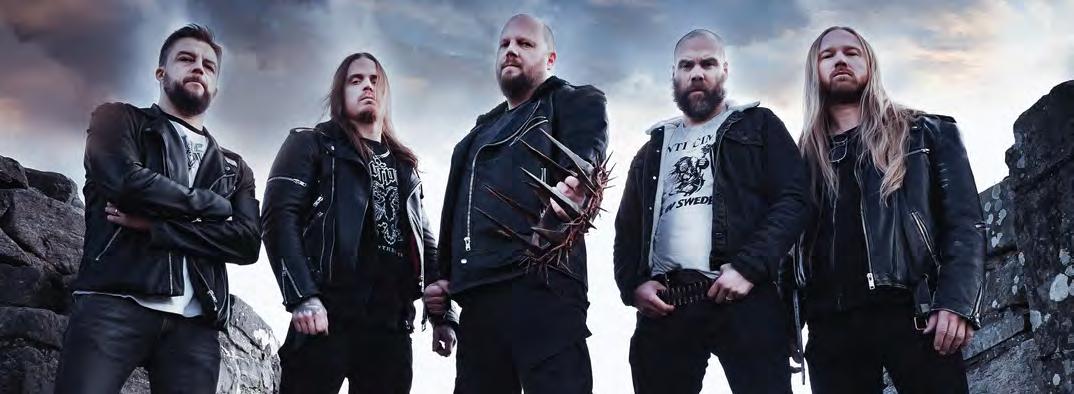
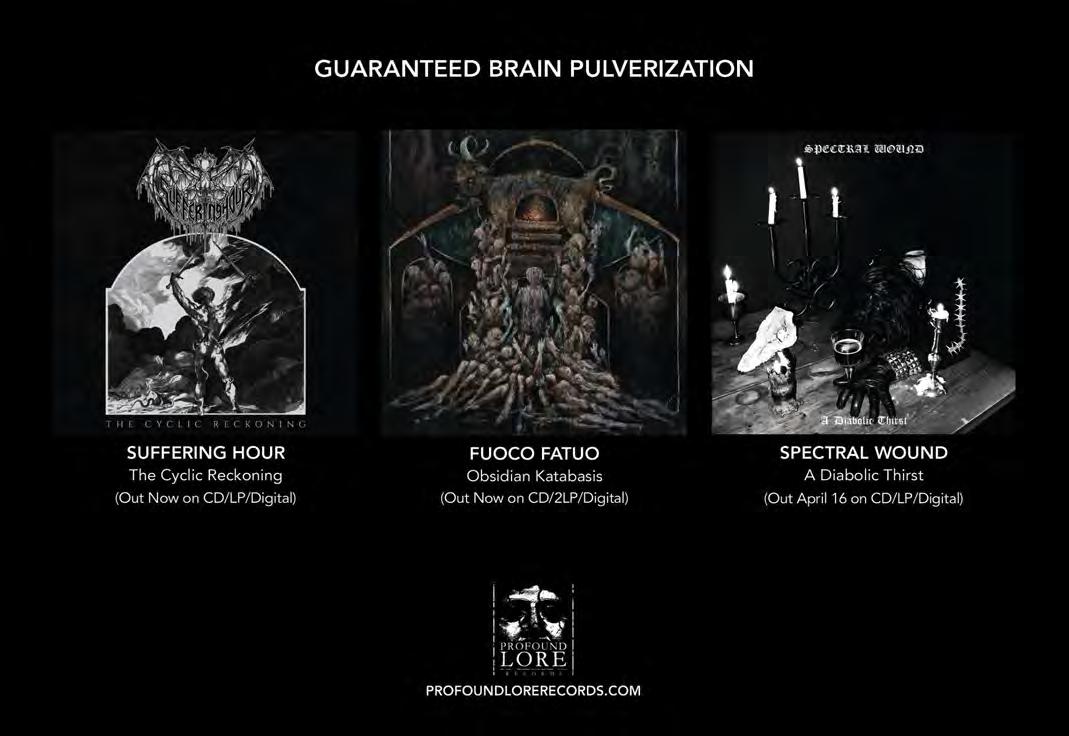

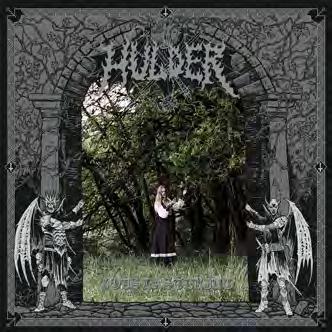
“Court” a sustained blast of “how come” bait— as in, “How come more vocalists don’t slide gracefully from clean to dirty vocals at just the right (unexpected) moment?” per vocalist Victor Vicart, and “How come more bands don’t stack massive (and massively intriguing) riffs in new ways while using comparably massive rhythm guitar parts as counterweights?” And so on. You could listen to this fucker dozens of times without completely unpacking it.
—ROD SMITH
EVILE
Hell Unleashed
NAPALM
8
None so evile
Blinking heck, Evile are back and they mean business. It’s fair to say that while Blighty invented heavy metal, when it came to its sprawling evolution, the wee isle was left in the dust whipped up by the frantic pits of America and Germany. It took until the ’00s thrash revival for four lads from Yorkshire to go toe-to-toe with their contemporary Teutonic and stateside brothers. Big Four-obsessed and with a skill to kill, Evile won over a scene in search of speed with their cheekiness and salt o’ the earth grit.
Thankfully, just shy of a decade in hibernation (and with a shake-up in the ranks), Evile have not turned soft. Hell Unleashed is just that, and pent-up quarantine fury is bubbling over across 40 minutes of punishment. Right off the bloodied bat, “Paralysed” is anything but, making way for a fullthrottled attack that makes us yearn for the days of dodging stage-divers.
Evile were the nice lads, the scamps who once pranked Metallica fans; now they’re pummeling skulls with a ’roid-raging beast of an album that threatens with violent velocity and an unrepenting hardcore stomp tinged with industrial menace. If Evile unleash anything this lockdown, it will be one-person circle pits until we can do them the in bare, sweaty flesh that this comeback deserves. —LOUISE BROWN
EYEHATEGOD 7
A History of Nomadic Behavior
CENTURY MEDIA
The end time isn’t here yet
If you’re wondering why the last couple decades of your life have felt off, maybe it’s because A History of Nomadic Behavior is only the second Eyehategod record since the year 2000. After their acclaimed return to the sludge throne in 2014, vocalist Mike Williams was diagnosed with cirrhosis, resulting in a liver transplant, and longtime guitarist Brian Patton split, leaving Jimmy Bower as the band’s only other member from back in the day. Stripped down to a quartet, EHG’s new record reflects that world-weariness, pulling down to something slower and denser and bleaker overall. It also confirms that the days of Dopesick are over, as the production is relatively polished (though far from mild or accessible). And that’s the same for the vocals.
Williams has long been one of the most compelling and deranged vocalists in heavy music, and his self-destructive rasp continues to clear up, to the point of being nearly comprehensible for much of the record. But there’s no question whose tirades are hitting the mic. Phrases like “a bounty of filth from heaven,” and references to things like glue traps and methadone are spewed throughout, making clear that there is only one him.
And that’s the pervasive feeling after a few listens. It is a simple truth that, despite many efforts, no other band can do this and make it sound so goddamn hopeless and depraved and foul. A History of Nomadic Behavior may not be the band’s crowning achievement, but the throne remains theirs. —SHANE MEHLING
FULCI
Opening the Hell Gates
TIME TO KILL
8
Undead death metal
When there’s no more room in Hell, the riffs will shred the earth…
OK, OK, so that’s (a variation of) George A. Romero’s immortal Dawn of the Dead (1978) tagline, of course. But considering Lucio Fulci’s Zombi 2 (1979) was, bizarrely, intended as the European sequel to Dawn, and Opening the Hell Gates by extreme metal uber-power trio Fulci is a record directly inspired by the Italian surrealist horror director’s City of the Living Dead (1980)… well, perhaps a little incestuous beyond-the-grave wordplay can be forgiven. Especially in light of how fitting the exhumed allusion actually proves to be.
Now, one might argue that Decibel is predisposed towards unholy unions of decay and metal. (Remember the April 2012 zombiethemed issue?) Yet, despite its unapologetic devotion to its namesake—from moniker to thematic content—Fulci transcend their own ostensible raison d’être (it really is more sincere and higher-brow than a mere “gimmick”) with this razor-sharp, twisty, gloriously nasty sonic tribute to the cinematic undead. Sure, if you’re a Fulci fanatic, sick, vibrant tracks like “Zombi Slam Squad,” “Deranged Minds,” “Incubus in the Surgery Room” and the title track will probably hit a bit differently. That said, anyone who enjoys dynamic, hook-ridden, untamed death metal is going to love the putrefying guts out of Opening the Hell Gates.
It honestly isn’t as disorienting (or just plain fucking weird) as a Fulci film, but in its epic, expansive attack, sense of filthy grandeur and the way it revels in the Beyond-esque outer reaches of brutality, this album and band are very much spiritual successors to the man’s unique and wild filmography.
—SHAWN MACOMBER
GIZMACHI 7
Omega Kaleid
THE ORCHARD
Or Sirius’ “’90s on 9,” for simplicity’s sake
The obvious questions confronting any band reappearing after a 15-year disappearing act are, “Where have you been and what you been doing?” Donning our musicologist’s hat, it’s not a stretch to imagine this rife-for-off-color-puns band has been a) paying off the interest from the buy-on fee that got them on 2005’s Ozzfest, b) listening to Meshuggah and c) religiously tuning into the morning zoo show hosted by Mad Dog and Mike on whatever station plays “All the Best Rock From Yesterday and Today” at home in Orange County, NY. We’re also assuming that convincing Soilwork’s Björn Strid to join as new vocalist took some time.
As disparaging as the above may sound, the fact is, Gizmachi have a knack for riding jagged polyrhythms and contrasting them with the sort of anthemic choruses that elevated Killswitch Engage and Fear Factory above their peers. Drafting in Strid has only stretched the boundaries of Omega Kaleid’s good cop/bad cop narrative. The Soilwork frontman has not only brought years of experience carving out an identity within melodic death metal to Gizmachi’s Destroy Erase Improve-esque sidewinding chug, but also his skill at creating hooky vocal phrases, no doubt influenced by his work with the Night Flight Orchestra.
There are times when the flow suffers from overwrought moodiness and bloat (“Inner Visions” “Paradox”), but there are more moments like “Shattered Dream,” which would open up the pit in parking lots and state fairs, while “Broken Ends” and the title track impressively balance railway spike heaviness and mixed drink sweetness without sounding like two bands fighting over the same sliver of real
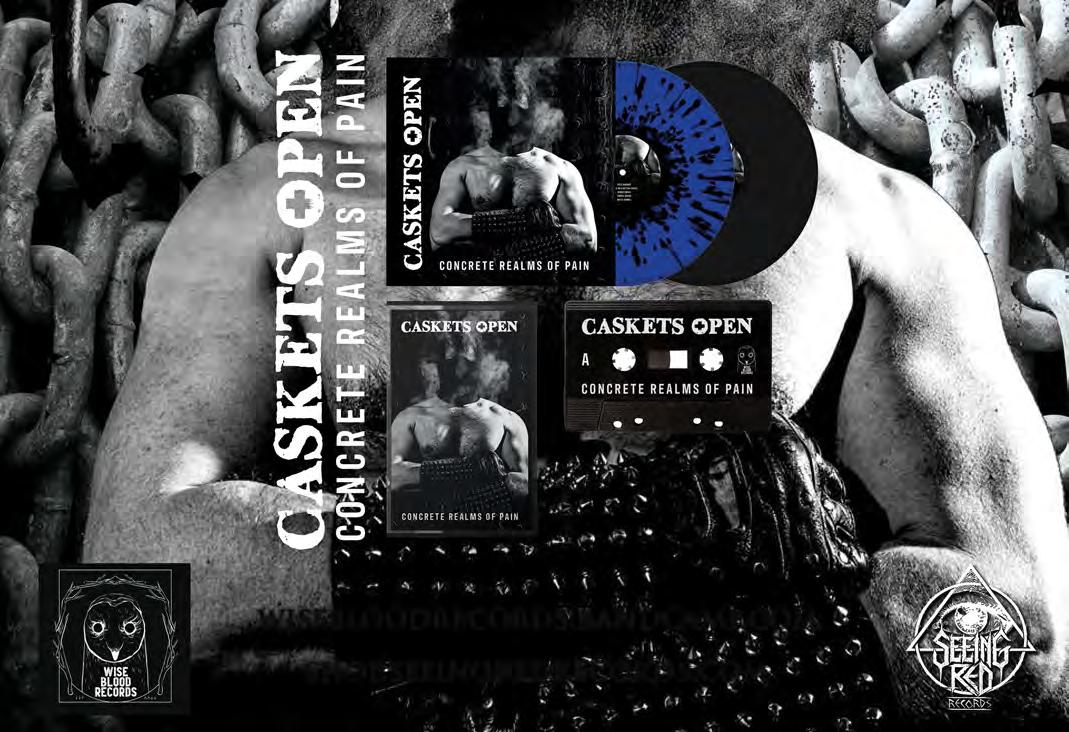
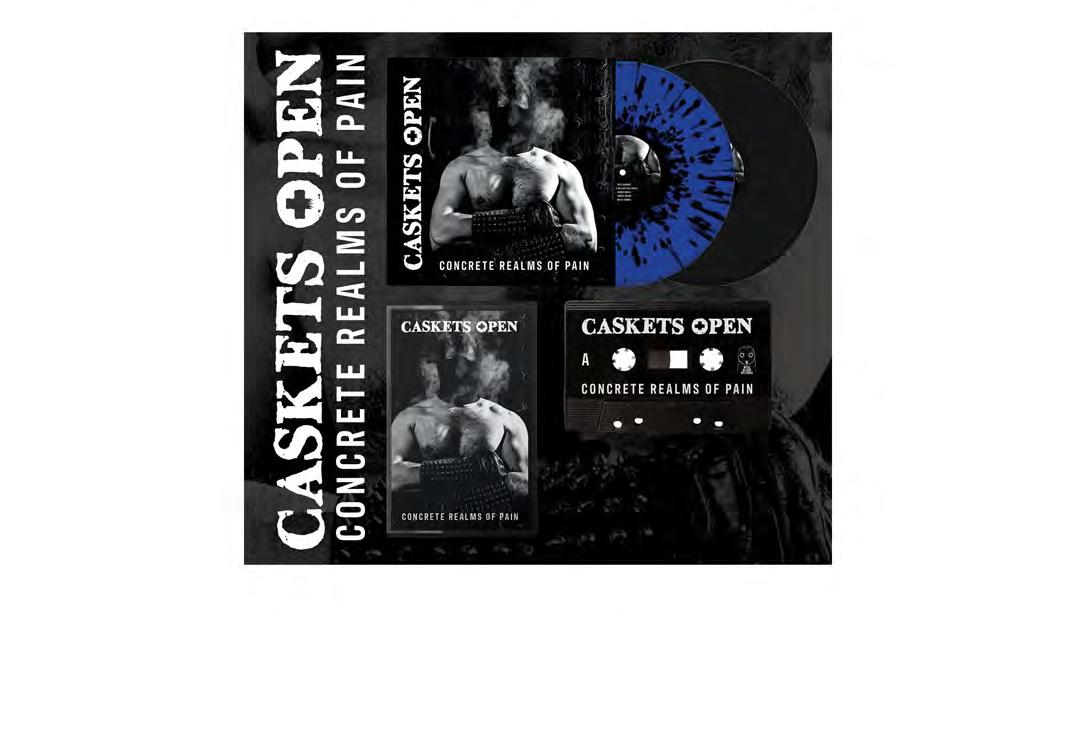
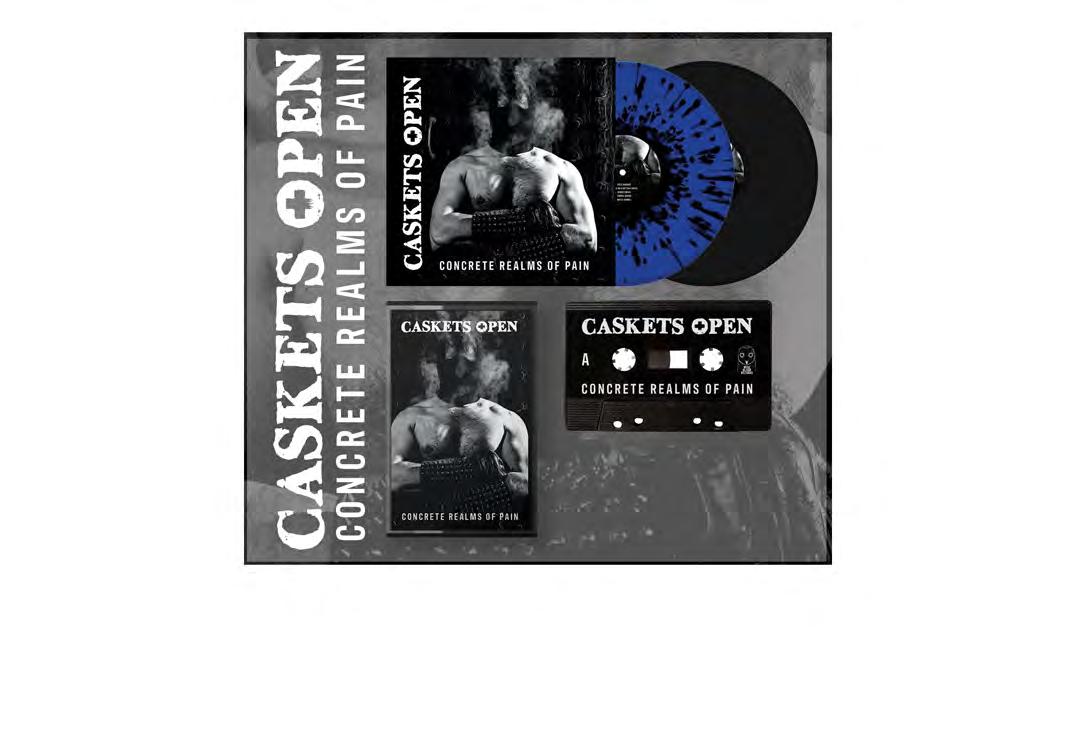


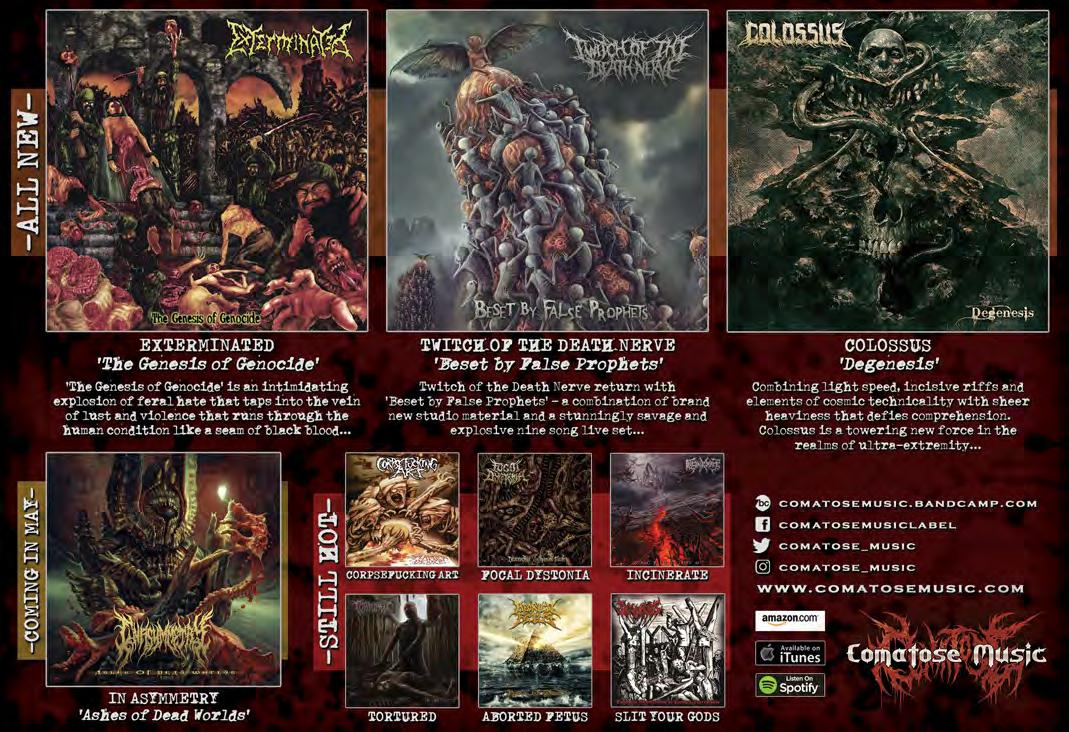
HAUNT 7
Beautiful Distraction
CHURCH RECORDINGS
Father and son
“In the beginning, I wanted Haunt to be a solo project,” Trevor William Church revealed last June in transitioning the band’s studio recordings to exactly that on Flashback, which burned rubber at No. 21 on dB’s Top 40 in the first year of our unholy pandemic. “I wanted to be the singersongwriter guy. One of my biggest heroes in the world is Cat Stevens.”
So is Phil Lynott (“super influenced by Thin Lizzy”), but the Fresno franchise made his point: Composition is king no matter the velocity. Touring alongside Municipal Waste and buddying up to Joel Grind proved that speed kills, so Church inlaid dual lead axes on synthkissed rockers and rockets on Haunt’s most inflamed disc. “Flashback takes the edge over previous 2020 full-length Mind Freeze for one simple reason: glorious, glorious synths,” pinpointed our own Jeff Treppel.
Follow-up LP Beautiful Distraction—final 2020 release Triumph conjoined revamps of the group’s first two EPs, Luminous Eyes and Mosaic Vision—tamps down the synthesizers, amps up the tornado-of-souls tempos and polishes the bandleader’s metallic anthems into pure pop standalones. He of the Megadeth tattoo unleashes nitroglycerin fretwork throughout (“In Our Dreams”) as RPMs ramp past 78 (“Sea of Dreams,” “Hearts on Fire”), but never sacrifices immediate melodies.
At such extreme acceleration, the songs begin to blur and the dynamic peaks don’t strike as bright as those on Flashback. Yet, bookends “Beautiful Distraction” and “It’s in My Hands,” with “Keeping Watch” in between, could strip down to their acoustic alter egos in a heartbeat. Tea for the Tillerman meets Bad Reputation? Not exactly, but Church just opened up a mosh at Starbucks. —RAOUL HERNANDEZ
LUNAR SHADOW 7
Wish to Leave
CRUZ DEL SUR
Total eclipse of the heart
Lunar Shadow’s identity feels as ephemeral as their namesake astronomical event. Although they initially trekked in a trad metal Solstice/Atlantean Kodex direction, their journey took them to strange places, and they’ve arrived at a “Tribulation with clean vocals” thing on third album Wish to Leave. It’s been a natural evolution, but a noticeable one nonetheless—even the thrashier prog metal elements of 2019’s The Smokeless Fires have largely been replaced with melancholy riffs and postpunk atmosphere.
The good news? This smokes The Smokeless Fires in just about every way, which in turn made far strides from 2016’s Far From Light. So, these Germans’ trajectory is pointed in the right direction. Better production, better use of Robert Röttig’s vocal range, better songwriting courtesy of guitarist/band mastermind Max Birbaum. The Fates Warning touches on highlights like “Delomelanicon” work nicely with the Sisters of Mercy-esque gloomy goth vibe. Plus, if you’re a Dire Straits fan, the guitar solos (especially on “To Dusk and I Love You”) feel remarkably like Mark Knopfler’s work. There’s a lot going on here. Thankfully, it all weirdly makes sense together.
The biggest thing Birbaum needs to work on if he wants Lunar Shadow to eclipse its peers is that all-important first impression. While songs
BriLlIaNT Execution KREATOR’s

classic Noise era is collected in one swing
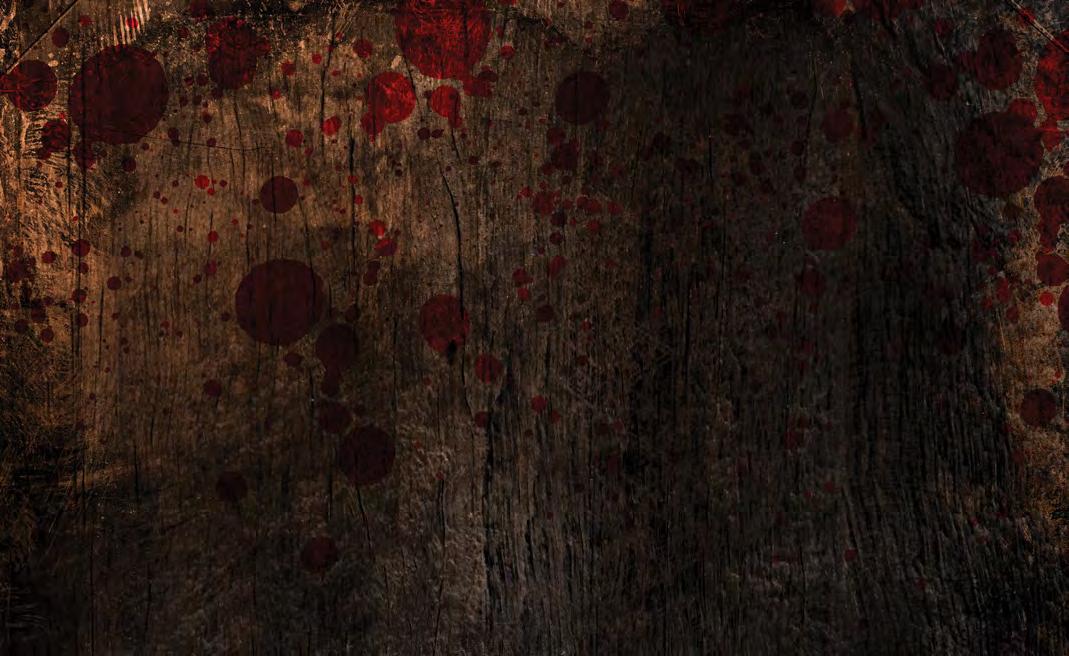
KREATOR
Under the Guillotine
NOISE
9
When it comes to shelling out for this type of expansive vinyl box set, the obvious consideration is this: Does it have enough “extras” to justify the cost? It’s a given that the five albums—Kreator’s first five fulllengths, including the Hall of Fame-inducted Pleasure to Kill—are worth owning, and all the better that they’re issued here in various types of colored vinyl, with original artwork and lyrics. Musically, this captures Kreator’s nascence in the German thrash scene and later progression into a world-class metal band capable of incredible diversity. These albums basically explain why Kreator are still a potent force today.
The musical bonuses included—such as demos, EPs and live sets recorded between ’85–’92—are many, though they have previously been made available through other CD reissues over the years. And since vinyl can only hold the original tracks, these bonuses are provided as MP3 files via a “demon figurine” USB drive. Another non-vinyl addition is the Some Pain Will Last DVD, which offers a mini documentary, two previously unreleased audio live concerts and an Andy Sneap remix of Live in East Berlin 1990. They’ve even included a reproduction of the Tormentor (pre-Kreator) End of the World demo cassette.
One of the coolest things, however, is the 40-page hardback book filled with rare photos, lyrics and Kreator ephemera. This is the kind of printed matter—something solid you can hold in your hands and pore over while listening to the music—that seems most appropriate for a vinyl box set. The actual box it’s all packaged in is pretty badass, too.
Clearly, there’s a lot to dig into, and there’s also plenty of value in simply having what amounts to the entirety of Kreator’s Noiseera recordings in one package. Diehard completists may already have all the music, but the little value-added details—such as the colored vinyl, the mini documentary and the cassette reproduction—may be too hard to resist. For anyone else, this is a fantastic deep dive into the formative years of one of the titans of thrash. —ADEM TEPEDELEN


like “I Will Lose You” definitely worm their way into your head after a few listens, they lack that initial grab that bands like, say, Tribulation have perfected. Nail that and their listeners will never wish to leave. —JEFF TREPPEL
MARIANAS REST 6
Fata Morgana
NAPALM
Songs of the dithering?
Gloom metallers Marianas Rest are doing Finland proud enough on this third full-length. A mix of Swallow the Sun, In Mourning and Rapture, the coastal dudes have forged a sound that is at once direct, yet reserved. While most new bands have the fingerprints of other bands in our Common Era, the Rest really don’t. They have that overarching doom/death metal thing that seems to fester deep inside the Nordics, in addition to the beastly dichotomy of melancholy and grit—sisu on downers perhaps—that Finland is world-famous for, but originality is not lost on the sextet.
The guitar work of duo Nico Mänttäri and Harri Sunila is passive-aggressive, one minute ponderous and courtly, the next fierce and lacerating. This is as true for lead single “Glow From the Edge” and the funeral-esque observation of “South of Vostok” as it is for the (almost) fleetfooted “Pointless Tale” and the Eeyore-ish opener “Sacrificial.” What stands out are the guitars, but even more so are the forefronted nature of Jaakko Mäntymaa’s serrated vocals.
At times, this works for Marianas Rest. With Mäntymaa’s roar, they’re able to drive home points of misery, anger and adversity; but at times, he’s far too high in the overall soundscape. The vocals are emotive, but the guitars, keys and rhythms are the power in the Rest’s crestfallen eight-track plunge. More of the latter, less of the former.
For sure, Fata Morgana never fails to set the mood—manic depressives, steer clear—yet after several journeys in the lower recesses of my proverbial nucleus accumbens, the only thing that stuck was the entirety of “Glow From the Edge,” with its effulgent zeniths and glum nadirs. —CHRIS DICK
MEMORIAM 7
To the End
REAPER ENTERTAINMENT
At ease, soldier
Memoriam’s death metal sound remains an instantly recognizable fusillade of 16th-note bass drum kicks and sawtooth guitar chug, the air thick with elegiac melody. This sound has been field-tested, proven to pull an audience into the trench to investigate the philosophical aspect of combat through the long lens of military history, to take in the sights of the battlefield as seen through the eyes of a pawn. Ultimately, it’s existential, about man usurped and under control from an authority unquestioned. As such, it is catnip to headbangers.
Led by Karl Willetts—a veteran of martial verse ever since Bolt Thrower’s 1988 debut, In Battle There Is No Law!—Memoriam might skew a little more doom, with tracks such as “Each Step (One Closer to the Grave)” evoking the sodden misery of the Peaceville Three, but your radar is not lying when it tells you that bombs are going to fall, and soon. This dynamic between moribund listlessness and mortal panic is bread and butter to Willetts.
Memoriam 2021 sees him joined by guitarist Scott Fairfax and drummer Spikey T. Smith, with Frank Healy (Sacrilege) on bass. All seem at home in a low frequency pummel that feels tonally of a piece with Mercenary-era Bolt Thrower. Anyone weaned on such fare might find a sense of calm, which seems counterintuitive, yet the hypnotic pulse of such mid-tempo death metal is comforting—like sleeping on a ship and hearing the engines thrum. That said, spitfires such as “Failure to Comply” and “This War Is Won” will shake you out of your reverie, while “Mass Psychosis” pitches a discordant curveball that calls to mind Godflesh’s claustrophobic hellscapes.
—JONATHAN HORSLEY
ORYX
Lamenting a Dead World
TRANSLATION LOSS
8
Bacdafucup
If you’re looking for a few dulcet tunes to cushion the blow as you hurtle toward the doom quarantine’s first birthday, you better keep movin’—Oryx will come to the party, but they’re bringing a bunch of gift-wrapped broken glass, and their incessant torture-screams will definitely wake up your neighbors. However, if you’re in the mood to longingly gaze into a fractured, grime-caked mirror held up to the existential horrors of modern reality, the Denver trio’s fourth LP is just what the plague doctor ordered.
Let the malevolent opening track “Contempt” serve as Lamenting a Dead World’s mission statement—ominous feedback and feral noise create an immediate sense of dread before drummer Abbey Davis pounds out an eight-count snare roll that leads to a barrage of highly neck-snappable sludge riffs, all while guitarist/vocalist Tommy Davis bellows and shrieks about the disgraceful nature of “all ‘God’s children’ [at] the edge of a cliff.” Subsequent dirges like “Misery” and “Last Breath” emit equally harsh vibes, but Oryx wisely inject enough sonic diversity (cavernous clean guitars, psychedelic soundscapes) to ensure the album hits more than one note throughout its 40-minute runtime.
Epic closer “Oblivion” benefits the most from this approach—around the halfway point, Oryx quietly introduce a hauntingly beautiful theme that steadily builds momentum until it blooms into a soul-crushing maelstrom (complete with cosmic synth dustings by Blood Incantation’s Paul Riedl). The song is indicative of the record as a whole: impeccably layered, full of atmospheric tension and appropriately gross-sounding for these supremely gross times. —MATT SOLIS
PHLEBOTOMIZED 6
Pain, Resistance, Suffering
PETRICHOR
What themes may come
Featuring their best album cover since 1994’s Immense Intense Suspense depicted a bootleg Gollum pointing at something from a surrealist outcrop, the latest EP from this legendary Dutch progressive death-doom outfit follows up 2018’s Deformation of Humanity with a graceful vengeance. Despite a 20-year lacuna between their second and third albums, guitarist and original member Tom Palms has maintained a steady course toward the outer reaches of extreme metal.
Like a European (and still active) Maudlin of the Well, Phlebotomized are at their best when they’re all over the place. Pain, Resistance, Suffering runs at so many different speeds, switching lanes and gears so frequently and fluidly that passengers aboard this wild craft are advised to jettison all expectations and prepare for anything. What at first seems unbelievable after repeated listens becomes undeniable.
With repeated listens also comes a deeper understanding. What was once indecipherably strange now feels familiar, like the fantastical death-doom number “Beheaded Identity,” or the inspirational epic fight song “No Surrender.” Even the short burner “You Have No Idea” makes sense once you break it down to something like Yes’ Rick Wakeman playing keys on My Dying Bride’s The Dreadful Hours. Although the EP defies expectations and genre boundaries, the song structures bear the weight of their collective imagination, bending but never breaking.
Ambitious as it is, Pain, Resistance, Suffering hits all of its marks—sometimes for better, some-
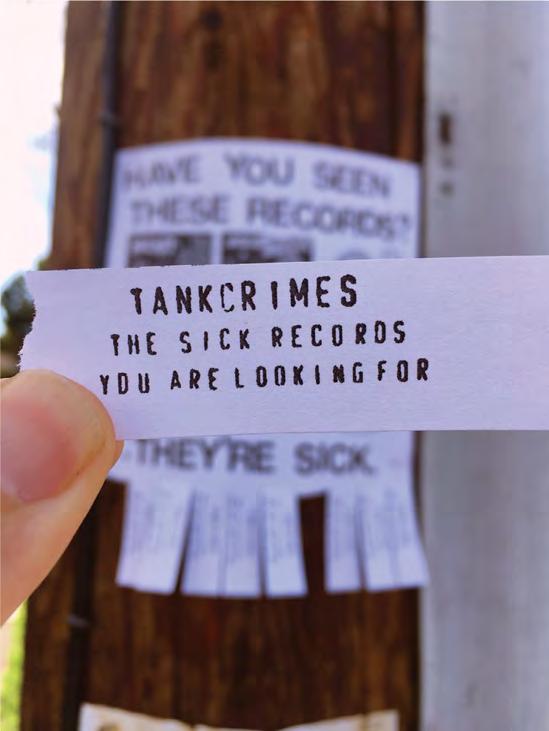
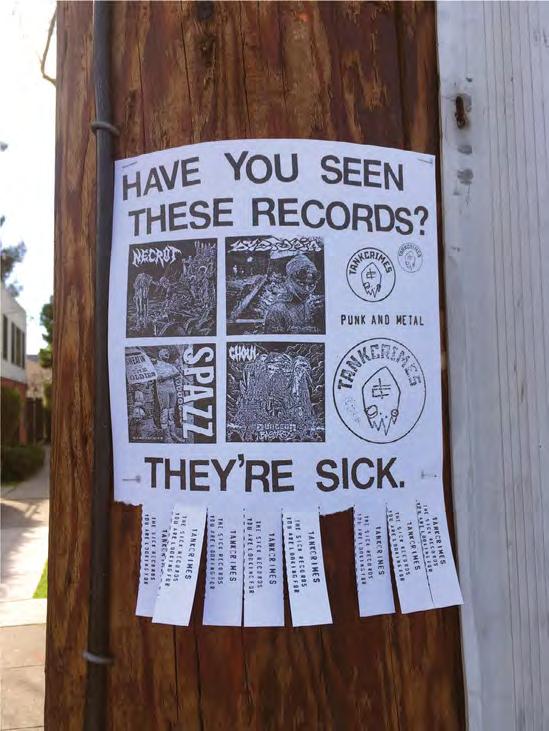
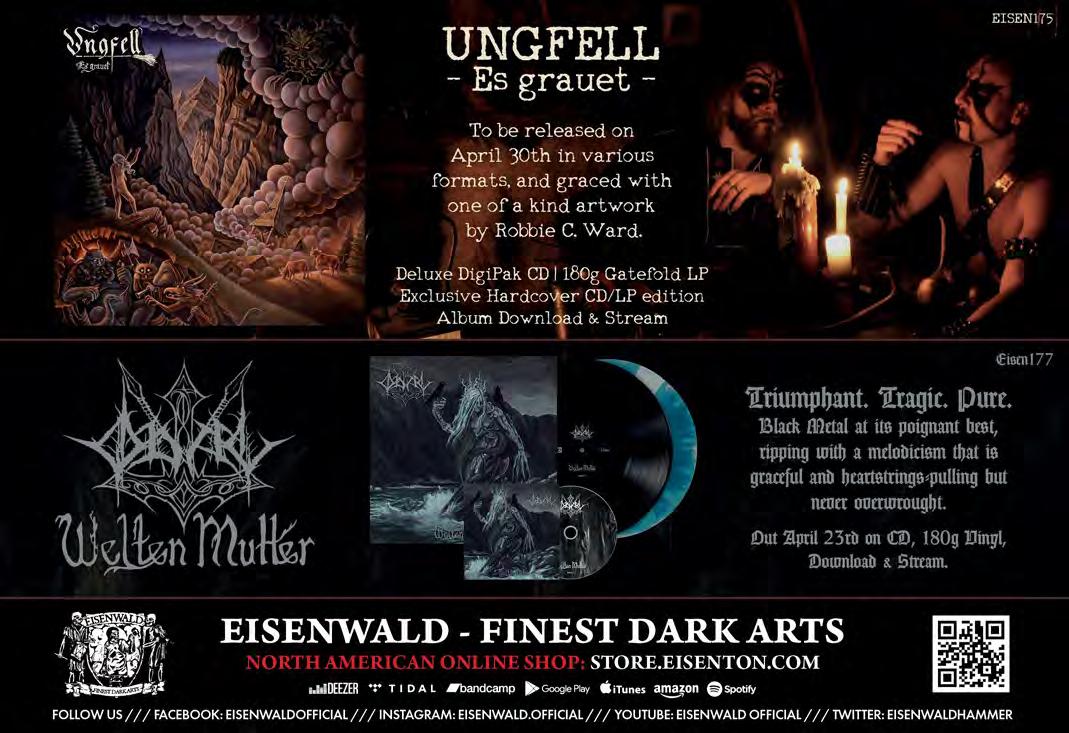

times for worse. But all of this madness folded into 24 minutes is—let’s be honest—a little nuts. Expect some motion sickness. —DUTCH PEARCE

SMITH/KOTZEN 6
Smith/Kotzen
BMG
Poisoned Maiden
File away Smith/Kotzen as a potential answer for this future Jeopardy question: “Unlikely rock/metal guitar duo featuring members of Iron Maiden and Poison.” To be honest, Adrian Smith’s recent book about fishing, Monsters of River and Rock: My Life as Iron Maiden’s Compulsive Angler, had more initial appeal to me than this collaboration. While I recognize that American guitarist Richie Kotzen’s career was not defined by his time in Poison (he was a Shrapnel shredder early on, did a stint in Mr. Big and has issued a slew of non-rock/metal solo albums), this connection with the longtime Maiden guitarist seems really unlikely.
Apparently, however, the two bonded over a love of “’70s classic rock,” which certainly seems to be at least an inspiration for the musical direction on display here. So, yeah, don’t expect galloping rhythms and epic historical tales, or glammed-up party-hardy entreaties. Smith/ Kotzen is, however, filled with the kind of slick hard rock that only two dudes who are this wellestablished can make, irrespective of its actual marketability. There’s no questioning the talent level here, as both have clearly established their bona fides in the music world at large, but the sell-by date for this kind of bluesy, groove-riding rock seems like it passed a couple decades ago.
The appeal of Smith/Kotzen from this Maiden fan is simply the guitar work. Both men resist the urge to turn this into a shredfest, instead offering up tasteful demonstrations of their ample skills that work well within the tunes. The songs themselves, featuring both men on lead vocals at various times, however, are mostly just mundane and uninspired. While the pair may have bonded over ’70s classic rock, this sounds more like it crawled out of ’90s “modern
rock” radio. —ADEM TEPEDELEN
SOCIOCLAST 8
Socioclast
CARBONIZED
Grind out the noise
Fans of old-school U.S. grind will be stoked on this new West Coast trio formed by ex-In Disgust guitarist/vocalist Matt Gomes and Deadpressure
THROUGH A SPEAKER RUMBLY THROUGH A SPEAKER RUMBLY
Indecent & Obsolete
BY DUTCH PEARCE
VICIOUS BLADE Vicious Blade
SELF-RELEASED Instantly bursting right out of your speakers, the self-titled demo from Pittsburgh-based death-thrash punks Vicious Blade wastes no time across its five face-slashers. From the steel-flashing ambush of opener “Banshee’s Blade” to the poison-tipped immediacy of “Burning Visions,” the demo’s closer, you won’t find anything like a moment’s rest on this tape. Backed by four of the hardest mugs from the Pittsburgh metal scene (ex-members of Complete Failure and Commit Suicide among them), the vocalist keeps pace and pours gas on the fire, occasionally trading her visceral growls for quick crossover shouts. The result is explosive and highly addictive.
MIASMIC OOZE Terrain of Inflamed Pustules
DESERT WASTELANDS This Miasmic Ooze demo sounds like spoiled meat smells. It’s like the four Birminghamers (Alabama, not England) put as much effort into making this sound harmful as they did in writing, practicing and performing these four slabs of rotten death-grind depravity. All in with its gruesome collage cover, Terrain of Inflamed Pustules is a welcome fetid breeze amid the vast caverns of contemporary death metal. A little more beatdown-oriented than the bands on their shirts ever were, but Miasmic Ooze are on their way.
THE TOVVER The Tovver
COGNITIVE DISCORDANCE This reissue of the Costa Rican trio’s self-titled EP is the first we’ve heard from the Tovver since it was originally released seven years ago. Their fifth release since forming in 2011, the four songs on The Tovver combine colossal riffing, mausoleum atmospheres and expertly placed samples of dialogue from warped films, always with some kind of unsettling intent. The tracks run without vocals, but the samples add that atmosphere that instrumental bands sometimes lack. Otherwise, The Tovver is almost unspeakably inhuman in its size and sound. Not straight doom—not all the time—but dark, moody and always heavy. PERILAXE OCCLUSION Exponential Decay
GURGLING GORE This Ontario-based duo materialized in December 2020 with their three-song demo, and ever since, the death metal underground has been divided between the assimilated and those who have yet to experience Exponential Decay. The first two tracks attack with a direct (although unique) immediacy, something like Planetary Clairvoyance-era Tomb Mold rebuilt by an insane Luc Lemay. But it all leads up to the brilliant eight-and-a-half minute closer “Rigid Body Displacement,” where Perilaxe Occlusion fold you up like so much origami.
FECULENT The Grotesque Arena
CALIGARI The Grotesque Arena, Feculent’s debut EP, features the prolific Australian death/grind drummer Brendan Auld, whose solo blackened doom campaign Snorlax released its demo on Caligari in 2018. Auld is joined by three equally capable Australians, and together they drag forth a snarling beast of a debut. The Grotesque Arena sounds built from complementary parts by four musicians who each showed up to make it as hard-hitting and malignant as possible. Without forgetting where the genre began, Feculent also acknowledge where and when they are; their debut’s massive production gives this beast all the room it needs.
DISFUNERAL Disfuneral
REDEFINING DARKNESS Originally released in 2017, this self-titled six-song demo is so underground that virtually nobody’s heard it yet. Thankfully, here’s Redefining Darkness to give these Frenchmen their just desserts. As you might have guessed from the “Dis” prefix, as well as their dripping Old English-style logo, Disfuneral shred old-school, crusty, thrashing death metal. With frequent tempo shifts, bluesy leads and guitar harmonies— not to mention a seemingly instinctual understanding of crafting short death metal tracks that explode, maul your face and run off with your body—Disfuneral savagely distinguish themselves as much more than just another gang of HM-2 stompers.


drummer Cris Rodriguez, with Colin Tarvin of Evulse, Acephalix and Mortuous on bass and vocals. Socioclast grind darkly and unapologetically. They’re adherents to the sacred devastation wreaked by legends of the genre like Assück, Terrorizer and late-’80s Napalm Death; thankfully, Socioclast embrace modern recording technology, and their self-titled debut is all the heavier for it.
This 15-track LP clocks in at about as many minutes, but what Gomes and company have crushed and compacted is truly impressive. It’s almost like a trick. On the outside, Socioclast seems like an abbreviated experience. Press play and suddenly it’s not just an album, but the mid2000s, when sociopolitically conscious grindcore reigned over the metal scene. One thing that has been sorely missing from the scene lately is bands with something real to say.
But it’s how Socioclast delivers these diatribes that will ultimately unite all of us. An ominous clean riff opens the debut, then the album attacks, rabid and abrupt, and doesn’t let up once. Brief as the experience may be, it’s akin to live warfare for all its combustibility and unrelenting, unpredictable carnage. Doom call-outs rise and fall like primordial behemoths instantly sent back to the mud by a sudden barrage of destruction. Breakdowns become fakeouts, and the only certainty is that the blasting
will return. —DUTCH PEARCE
SPECTRAL WOUND 8
A Diabolic Thirst
PROFOUND LORE
What would an imperial saison noire even taste like?
A Diabolic Thirst is killer. Buy or die. Shit, buy and die. That’s how great this sounds. It’s like someone let early 1349 off the leash again to scour the Earth with liberated post-apocalyptic hellfire.
Spectral Wound hail from Montréal, home of the frostiest demon orgies this side of the North Sea, a region previously repped by souldesecrators like Rage Nucléaire, Incandescence and Gevurah. This violent quintet is on its third record, and A Diabolic Thirst raises the stakes on their earlier work in every way.
It’s tempting to say that evil drips off this album like the most poisoned divine nectar, but the rabid, slashing guitars, drums and vocals never settle long enough for any of that viscid substance to ever fall the direction that gravity usually requires. This evil splashes all over the walls and ceiling, coating everything in the most wonderfully gruesome ways. Jonah Campbell’s vocals absolutely slay, but they’re just the razorfilled cherry on top. The songwriting on display has a more sophisticated bent, even while a trebly grime clings to every corroded surface. I’m a sucker for anything that hints at raw noise, and this recording edges toward the noisiest waveforms without once employing anything but the blackest of metals.
After the daunting pace set by most of the music here, “Mausoleal Drift” proves that Spectral Wound can sculpt their queasy terror into slabs of derelict doom, too. The cover photo’s a little prosaic, and closer “Diabolic Immanence” doesn’t quite match the quality of the half-hour that precedes it, but those are minor quibbles. This brew should quench your bloodthirst. —DANIEL LAKE
STEEL BEARING 7 HAND
Slay in Hell
CARBONIZED
Swing of the axe
Power Trip’s emergence on 2013’s Manifest Decimation and their ascent that followed—along with efforts from others such as Noisem—helped re-legitimize the thrash scene following a failed party-hard revival. Right now, however, it seems as though thrash, in order to remain relevant going forward, really needs to be melded further with the established rampant strains of black and/or death metal. Since 2010, Texan death-thrashers Steel Bearing Hand have been quietly tinkering with that formula. And perhaps their minor status will change if second LP Slay in Hell lands on the radar of those who like their thrash riddled with more subterranean sounds.
The aptly titled “Command of the Infernal” bolts like any good extreme metal opener should. It’s a high-energy affair that has a tinge of BM to it—similar to Hellripper’s snarling take on this sound. “Lich Gate” maintains the frantic pummel of its predecessor, but with a streak of Seven Churches apparent. “Tombspawn” smartly drops tempos to “Where the Slime Live” levels during its early instrumental intro, shifts to modern Cannibal Corpse—all hyper-paced syncopations—and peaks with an incisive solo section.
But as well-constructed as all of those stylistic transitions are, Steel Bearing Hand are at their most impactful when death metal is pushed through a thrash prism and not vice versa, as on highlights “Per Tenebras Ad Lucem” and “’Til Death and Beyond.” If they can write a full album in the vein of those kinds of vicious blitzkriegs, we’ll have another band really worth championing in a post-Nightmare Logic world. —DEAN BROWN
STORTREGN 7
Impermanence
THE ARTISAN ERA
Being smarter than everyone else can be crippling
There’s a fine line between sounding like a baroque, buzzing maelstrom of layers sculpted into knife’s-edge blackened death metal and sounding like the chaos of Guitar Center on the Friday night of pay week. This Geneva quintet blazes along both sides of the divide.
Impermanence is the Swiss veterans’ fifth album in a decade, and pulsates with structure, smarts and agility as often as it gets bogged down in clutter, meandering and jumble. Those unable to OD on tech-death despite how much they mainline will recognize similarities to Obscura, Gorod, Beyond Creation, Necrophagist, Gory Blister, et al. Were those same folks able to stop gawking at the fretboard gymnastics, bassist Manuel Barrios’ summoning of Stu Hamm and Samuel Jakubec’s ability to hit five pieces of his drum kit with four appendages at 200 miles an hour, they might notice how this album’s best moments come when the technical wizardry is cut with Dissection’s melodic sense. When those worlds collide, the result is masterful, sublime and triumphant (“Timeless Splendor,” “Multilayered Chaos”). The impact underwhelms when the title track’s scalar run cascades shoot out like broken spokes from a bike wheel, ultimately obscuring the riffing centerpiece.
Impermanence’s staying power is limited because too much of the wailing and widdling is interchangeable. Drop the needle on the stunning, extended, orchestrated midsection in “Ghosts of the Past” and you might as well be dropping the needle on “Cosmos Eater”’s showoff sequence. Listen with a razor-sharp ear and you’ll be blown away, but you’ll require a razorsharp ear to cut through the scholastic chaos.
—KEVIN STEWART-PANKO
VARMIA 6
Bal Lada
M-THEORY AUDIO
White shirts on a tombstone
Poland’s contribution to black metal over the last year is weighing heavily on former strongholds Norway and Sweden. Indeed, Mgła, Kriegsmaschine and Batushka (assuming that most side with Krzysztof Drabikowski) have carved severely into and positioned significantly atop their white eagle-born black metal flag near the crown of the global
heap. The country made famous in our legion by Vader’s intrepid drive (and later Behemoth) is now overrun with bands like Olsztyn’s Varmia, which formed a mere five years ago and now have three full-lengths—of which Bal Lada is the newest—under their respective krakuskas.
While the use of “white voice”—a traditional singing technique in Poland and Ukraine—is staged as a unique identifier, it’s kind of difficult to discern its place in Varmia’s dissonant, angular whirl. Perhaps it’s best represented in “Upperan” (or the Skittles shake of “Zari Deiwas”), but don’t get crossed thinking the Poles are advancing on Einar Selvik’s pagan-fed world music-isms. Bal Lada—and the 10 tracks that call it home—steers more into the same inky, inharmonious morass of their contemporaries than hitting the same vein that Dead Can Dance’s Into the Labyrinth flooded all those years ago.
Varmia’s major stumbling block is that they’re conflicted. The Satyricon/Hagalaz’ Runedance miscegenation is off throughout Bal Lada. Successful integration of folk music elements in black metal (or vice versa)—Cruachan’s nightly soil on Tuatha na Gael remains a salient example— continues to have its challenges. Varmia have the talent, just not the vision. —CHRIS DICK
WITCHSEEKER 6
Scene of the Wild
DYING VICTIMS PRODUCTIONS
Same ol’ situation
Dying Victims Productions is undoubtedly riding a molten wave from the international metal diaspora—their strongest recent releases include albums by Japanese trad metallers Significant Point, Switzerland’s extremely epic Megaton Sword and French black thrashers Hexecutor. Singaporean act Witchseeker is their newest acquisition, a one-man project turned full band that proudly wears their influences on their sleeve: they love the ’80s and all bands that emulate the sexy (read: feathery, cocaine-addled) side of it; they love dry and natural production; and they love speed/trad/thrash/glam.
Take the opening title track—you wouldn’t be at fault for assuming it was an outtake from Enforcer’s 2010 fan favorite Diamonds. Otherwise, on Witchseeker’s sophomore album, the shredding is constant and driving—check the solos in “Lust for Dust” or the latter half of “Nights in Tokyo.” These squealing, dueling guitars help elevate Scene of the Wild beyond 2017 debut When the Clock Strikes (props are owed to guitarists Nick Stormbringer and Brandon Brandy). Similarly, closing track “Hellions of the Night” kicks up the pace and is the LP’s obvious highlight.
Unfortunately, the remainder doesn’t quite live up to the standard set by the solos. Featuring the gruff, shouted vocals of bassist Sheikh Spitfire, poppy structures not unlike those found on an AC/DC record and dry production on Aip Sinner’s driving, simplistic percussion, the songs are hard to differentiate from mid-2010 projects like Skull Fist, Cauldron and the aforementioned Enforcer. There’s an ample dose of the Sunset Strip, bandanas and leather, and these musicians are highly competent, but this specific style became oversaturated nearly a decade ago. To break through the noise, Witchseeker need to introduce new elements, or variations on a too-
familiar theme. —SARAH KITTERINGHAM
WOLF KING, The Path of Wrath 7
’Cause eight out of 12 ain’t bad | PROSTHETIC Following up their debut full-length Loyal to When Wolf King go full-on and tear through the Soil with the equally rhyming The Path a song like fire tears through a Norwegian of Wrath, Wolf King have gotten meaner and church, it hits just like you want; but when riffier. And that really works for them—at least they slow it down and the hooks come out, for a little while. it’s clear they’ve upped their riff game
The band’s debut was closer to a thrashy considerably. And this balancing act goes hardcore record with blackened elements, great for the first two-thirds of the record. but they’ve moved away from hardcore and Then it gets a little dicey. closer to both black metal and regular metal, The eighth track, “Incantation,” ends as which turns out to have been a great decision. though the record is over, and this would have made for a tight, very burly album. But the band keeps going for another four songs, which overall feel lesser than what came before. The melodic backing vocals on “Grief Portrait” are nice, but not quite enough to save it. And while closer “Eternal Hunger” has a pretty killer part, we’ve already gotten an earful, as that same part is used for the extended intro.
The Path of Wrath is a really great record with a lesser EP bolted onto the end. Wolf King are writing better songs, but they may want to be a bit more judicious on what exactly makes the cut. —SHANE MEHLING












